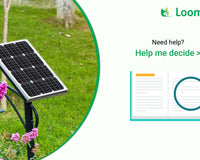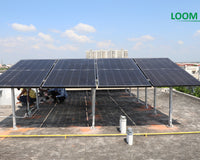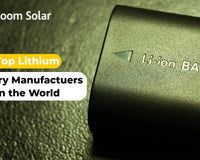We all know by now, that a solar panel is a device that absorbs sunlight and converts this energy into usable electricity. As the price of a solar panel goes down and efficiencies improve, it is attracting masses all over the world to go off the grid. Once you incur the cost of a solar system and its installation, you can practically generate free electricity over the next 25-30 years. But how is this solar panel made, what materials are involved, how different parts are put together to result in a device that is capable of providing you with free electricity?
Are you curious about how a solar panel is made? What processes are involved to get to the final product? Well, for all those who are seeking answers to these questions, you have come to the perfect place. Today we are going to take you inside Loom Solar’s factory at Sonipat, Haryana, where we meet Mr. Anoop - Engineer, who will take us through all these processes in a step by step manner. There are a total of 20-25 machines which involves about 18 steps to finally make a complete solar panel. So let’s see how a solar panel is made. These steps are other than the Incoming Quality Check (IQC) and Final Quality Assurance (FQA).
Step 1: Cell Cutting

Using a laser cutting machine, cells are cut out. Depending upon the wattage of the panels you want, the size of a cell is determined. For a full cell size modules, this process is skipped.
Step 2: Stringing Process

It is a fully automated process. Here at Loom Solar, we are using any cell of size greater than 39 mm. These cells are then assembled or soldered together. The upper Sun facing Side (Blue / Black side) is the negative part while the bottom white side is positive.
Step 3: Solar Glass

Once the cells are stringed together, the machine transfers it to tempered glass, which already having ethylene vinyl acetate (EVA) encapsulation layer over it.
Step 4: Visual Inspection

The cells are examined by a technician for any fault or error in any string.
Step 5: Taping

In taping, a technician tapes the cells into a matrix alignment.
Step 6: Connection

Connections are then soldered together. Any excess material is cut out.
Step 7: Insulate Module Connection

The next step consists of insulating the connections by using a back sheet and EVA encapsulation. This process protects the module from any dust and moisture.
Step 8: Mirror Observation

The module is visually checked once again for any dust particle, colour mismatch, etc.
Step 9: EI Testing

EI Testing or Electroluminescence test is the real testing of the module made so far. It is a testing process, where the module is kind of scanned in an EI machine. We can easily spot any dead or low power cell, short circuit cells, cracks, etc. If any such error is spotted, the module is sent back for fixing the error.
Step 10: Lamination Process

The module is laminated at 140-degree Celsius. This process takes approximately 20 minutes. After lamination, the modules are left for 10-15 minutes to cool down till it reaches room temperature.
Step 11: Trimming Backsheet

This step involves cutting off the excess material of the back sheet to make perfectly shaped modules.
Step 12: Frame Cutting

In this step, frames of different sizes are cut out for bordering the panels.
Step 13: Frame Punching

Then holes are punched in the frames for the purpose of mounting and grounding the panels.
Step 14: Sealant Filling / Framing

A sealant protects the panels from air, dust, and moisture and helps the module to firmly attach on the frame. After the frame is attached to the module it is again sent to the framing machine, where it is punched to make sure it is permanently attached to the frame.
Step 15: Fixing Junction box

A junction box is attached to the module using the sealant to firmly attach it to the structure. Connections are then soldered and left for 10-12 hours for curing, so that the structures are perfectly dry and attached properly.
Step 16: Clean Module

The module is then wiped outside to remove any traces of dust, foreign particles or extra sealant.
Step 17: Module Testing

The module is connected to check its output current, voltage, power, etc. A report is generated for each module’s output data. A back label (with all details) is pasted behind the module for the benefit of the users. Finally, the module is sent to the QC lab where it is tested for insulation resistance. A 3000 V DC is passed through it for a minute. If the panel can endure the current, it is passed else failed. Then it is sent to Mechanical Load Test.
.
Step 18: Packing

After Final Quality Assurance (FQA), this is the last step in the module manufacturing process, where the modules are safely packed into large boxes for transportation and storage.
Watch Video: Loom Solar Manufacturing Plant
Conclusion
Loom Solar, which is one of the leading solar companies with a huge online presence in India has come up with an on-grid solution which will function even without a net meter. Its 1 kW Solar AC module is capable of generating enough power to comfortably run one air conditioner (up to 1.5 ton), along with refrigerator, TV, fans and lights during the day for 2-3 bhk house, hospital, office, petrol pump, educational institution, etc.












